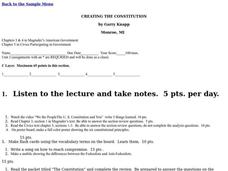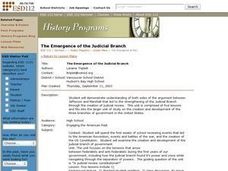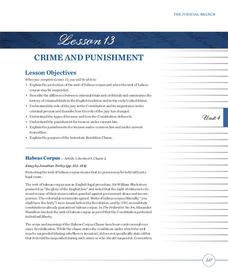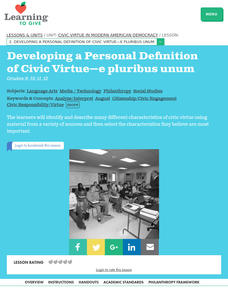Curated OER
Last Moments of John Brown
Students read the history of John Brown. Using the internet, they research commentaries on the raid at Harper's Ferry. After observing a painting, "The Last Moments of John Brown," students analyze and write about what they see, think...
Curated OER
Holding a Wolf by the Ears: Race, Economics, and the Complexity of Thomas Jefferson
Eleventh graders explore the era of slavery when Jefferson was President. For this United States History lesson, 11th graders participate in a class discussion that is led by the teacher. A PowerPoint presentation on the topic is...
Curated OER
CREATING THE CONSTITUTION
Learners engage in a variety of activities aimed at strengthening comprehension of the Constitution. The activities are part of a layered curriculum and students create a portfolio for assessment.
Curated OER
"Father" of Our Country vs. "Father" of the Bill of Rights
Students examine the relevance of the Bill of Rights. In this Bill of Rights lesson, students study the parts of the Constitution and the ten amendments. They investigate the rights and responsibilities that accompany being an American....
Curated OER
The Emergence of the Judicial Branch
High schoolers demonstrate understanding of both sides of the argument between Jefferson and Marshall that led to the strengthening of the Judicial Branch through the creation of judicial review.
Curated OER
Consequences of the Sedition Act
High schoolers research and discuss the consequences of the Sedition Act. They illustrate the difficulty of balancing security needs and personal freedom using an example from John Adams's presidency.
Curated OER
George Washington: The Precedent President
Students investigate precedents set during George Washington's term in office. They conduct Internet research, develop a list of the responsibilities of the President, match Washington's accomplishments with the list, and play a game.
National Endowment for the Humanities
George Washington: The Precedent President
Everyone knows that George Washington was the first president, but do your scholars know why that was so important? The lesson plan, the third in a sequence of three, allows learners to understand how George Washington set a precedent...
Curated OER
The Election Is in the House: 1824: The Candidates and the Issues
Students list some changes in presidential election laws and/or procedures since 1796, and cite examples from presidential campaign materials from 1824.
What So Proudly We Hail
Life, Liberty, and the Pursuit of Happiness: A Lesson on the Declaration of Independence
What does it mean to say that a right is unalienable? How did the founding fathers convey this revolutionary concept in the Declaration of Independence? Engage in a close reading and analysis of the Declaration of Independence, and...
Constitutional Rights Foundation
Naturalized Citizens and the Presidency
Article II, Section 1 of the U.S. Constitution takes center stage in a lesson that asks class members to assume the role of state senators, debate a resolution to amend the U. S. Constitution to permit naturalized citizens to run for...
National Endowment for the Humanities
Lesson 4 James Madison: Internal Improvements Balancing Act—Federal/State and Executive/Legislative
Who has the power? The founding fathers asked the same question when the United States was formed. Learners explore issues that arose during Madison’s presidency that raised constitutional questions. Through discovery, discussion, and...
San Antonio Independent School District
The Election of 1824
Here is a nice set of worksheets to get you started on teaching your young historians about the "Corrupt Bargain" in the presidential election of 1824, as well as the Tariff of 1828 and the emergence of new political parties.
Heritage Foundation
Crime and Punishment
You wouldn't give someone a 10-day timeout for eating a piece of candy. The US government, too, does not believe in unreasonable punishment. A variety of exercises exploring the clauses of the US Constitution prompts class members to...
Ashbrook Center at Ashland University
Bill of Rights
Do citizens need protection from the federal government? Scholars investigate why the framers of the Constitution created the first 10 amendments and what these amendments mean to citizens of the United States more than 200 years later....
National Endowment for the Humanities
The President Under the Articles of Confederation
The Articles of Confederation sounds like one big, fancy title to middle schoolers. Here, scaffolded steps help to ease novices into understanding this all-important American document. Discussion questions, lesson activities, and ideas...
Curated OER
Like Father, Like Son: Presidential Families
Students examine the role of the President. They discuss the President's responsibilities and compare both father/son presidents (Adams and Bush).
Curated OER
The Election Is in the House: Was There a Corrupt Bargain?
Students take a stand, supported by evidence, on whether there was a "corrupt bargain" between Henry Clay and John Quincy Adams.
National Endowment for the Humanities
Lesson 2: The Debate in Congress on the Sedition Act
Pupils research and discuss the provisions in the Constitution that supported the arguments for and against the Sedition Act. They articulate objections to and arguments in favor of the Sedition Act.
Curated OER
Thomas Jefferson on the Sedition Act
Students research and cite arguments Jefferson used in objecting to the Sedition Act. They discuss Jefferson's opinion on how constitutional questions about the Sedition Act could be resolved.
Curated OER
From the President's Lips: The Concerns that Led to the Sedition (and Alien) Act
Students research and briefly summarize the international situation during John Adams's presidency. They list the concerns that led to the Sedition Act and describe it.
Curated OER
Civic Virtue in Democracy
Students identify and describe characteristics of civic virtue. Following a class discussion, they create their own definitions of civic virtue. They write essays based on their own definitions and formulate conclusions on the state of...
Curated OER
In His Own Words: James Madison On the Problem of Faction
Students are introduced to the writings of James Madison and explain why he is often called "The Father of the Constitution". Using primary source documents, they examine his view of the Bill of Rights and what he meant by faction. In...
Curated OER
Online Lesson Political Parties, Platforms, and Planks
Students explore historical political parties and their platforms. After studying the origins and functions of political parties, students create their own platform to address current issues. In groups, students design an ad campaign...

























